The Storyteller: Greek Myths
For this first proper blog post for the ‘Autumn of Perseus’, I want to discuss a particular episode in the sadly short-lived television series The Storyteller: Greek Myths (1990). It’s noteworthy for being a fairly accurate summary of the Perseus myth, so that I can recommend this to anyone who wants a quick refresher or wishes to introduce their children to Greek mythology, even though it omits one important aspect, which I will mention below.
The Storyteller was a short-lived television series that ran in 1987. Produced by the Jim Henson Company, it used puppets to create non-human creatures, including the eponymous storyteller’s dog, who would comment on the stories that the storyteller narrated. The framing device of using a storyteller worked well, since it allowed the writers to move the story along at a steady clip and skip anything that wasn’t interesting or couldn’t be realized on the show’s budget.
Due to low ratings, the show ended after only nine episodes had aired (the final three were not shown until later). In 1990, the Jim Henson Company produced a mini-series called The Storyteller: Greek Myths. The title role had been portrayed by John Hurt in the original show, but he either didn’t want to or couldn’t return, and was replaced by Michael Gambon for the new series, which consisted of four episodes of about 24 minutes each:
- Theseus and the Minotaur
- Perseus and the Gorgon
- Orpheus and Eurydice
- Daedalus and Icarus
Both the original show and the mini-series are well worth checking out. They feature some of the Jim Henson Company’s best work. But for this blog post, I obviously want to focus on that second episode in the list above, which deals with the story of Perseus.

The show opens with the storyteller and his dog creeping through some underground tomb. They stumble upon a number of petrified warriors (or statues?) and, a little further, they discover the stone head of Medusa. This was the head of a woman who lived far away, who possessed ‘wings of bronze’ (an interesting element, characteristic of Archaic Greek depictions of gorgons) and ‘the breath of corpses’; ‘her hair was a nest of poisonous snakes.’ He explains that Medusa – but perhaps not her sisters, who also lack the snake-hair – could petrify you with her stare.
This is when the actual story begins. The plot follows the original myth closely, with Acrisius (Arthur Dignam) asking the Oracle for insight into the future, and then being told that his daughter will birth a son who will eventually kill him. Acrisius locks Danaë (Kate Buffery) away in a bronze chamber, which fits some versions of the original myth.
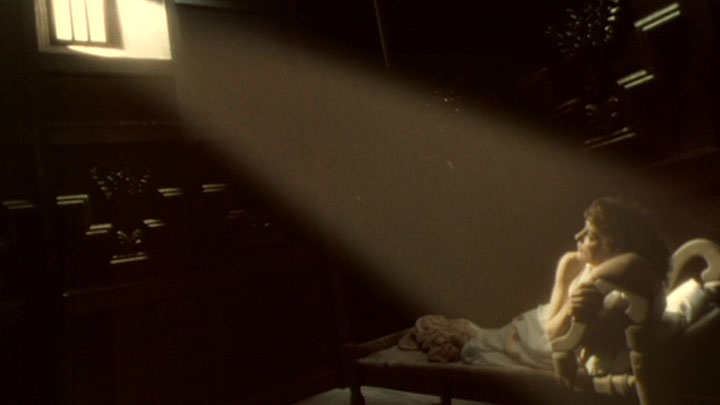
There are comedic touches provided by the dog throughout much of these episodes. When the storyteller tells of Zeus raining down on Danaë in a shower of gold (both accurate and remarkably child-friendly!), the dog naturally inquires what he was doing. ‘Fulfilling the prophecy,’ the storyteller explains. ‘Oh… that’s how it’s done!’
Perseus lived alongside his mother in the bronze chamber, day after day. She tells him stories, including the tale of Medusa. This is a convenient plot device – the myths skip Perseus’ youth largely – as it explains how Perseus came to know about the gorgons in the first place. His mother gives him a wooden sword, made from a piece from her bed, and he starts to pretend fighting. The noise alerts Acrisius, however, and he discovers that Danaë had a child.

Danaë and Perseus are locked in a – reinforced and a little modern-looking! – chest and cast into the sea, as per the original myth. Dictys, the fisherman, discovers the chest and rescues Danaë and her son. We then skip forward to the point where Perseus (Jeremy Gilley) has grown up. Polydectes, ruler of the island, shows up and tells Perseus he needs a father. ‘How would you like me to be your father? How would you like to live in a palace?’
Polydectes wants to marry Perseus’ mother. ‘Leave my mother alone!’ Perseus cries. This is perfectly understandable; Polydectes, played by John McEnery, comes across as slimy and untrustworthy from the first moment he slithers into frame. Dictys explains that, essentially, the king steals from his people. ‘Gatherer of beautiful things,’ Polydectes adds while caressing Danaë’s hair.
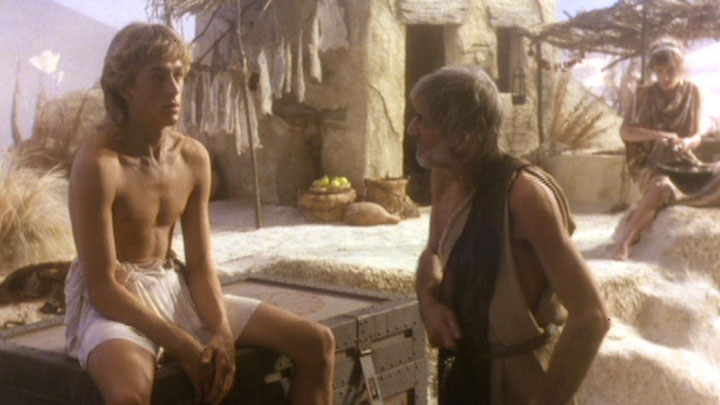
Unlike the original myth, Polydectes outright says he will marry Danaë in six days. Perseus is welcome to attend, if he can afford a bride-gift. ‘Bring me your chest full of gold coins,’ Polydectes says, but Perseus answers that he has no gold. At this point, Perseus remembers the story of the gorgon as he picks up his old wooden sword.
‘I’ll bring you something better than gold,’ the boy says. ‘I’ll bring you the head of the gorgon.’ Acrisius laughs and says that would be a great wedding gift. ‘I will bring you the head of Medusa and there will be no wedding!’
I actually like what the screenwriters did here. This part of the Perseus myth is the least clear in the story. Timothy Gantz, in his Early Greek Myth (1993), spends more than a page discussing this part of the story (pp. 303–304) and concludes that the surviving accounts are confusing. The summary in the Bibliotheca glosses over the issue largely and it isn’t exactly clear from any source how Polydectes’ desire to marry Danaë would cause Perseus to go out and slay Medusa.
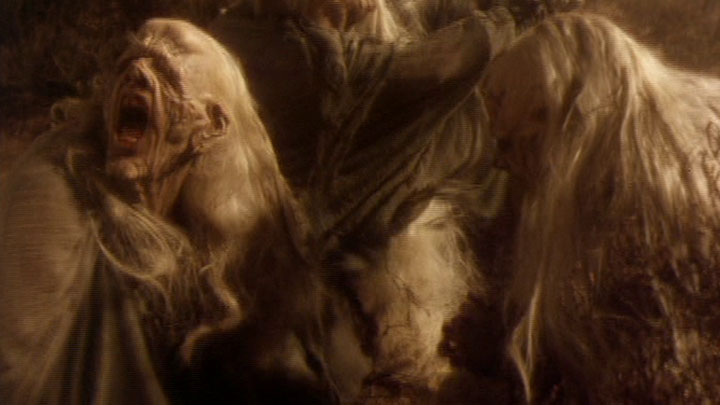
Athena and Hermes decide to help Perseus. They gave him a real sword and a bright bronze shield. Athena also gave Perseus the advice never to look at the gorgons directly. ‘Go the Graeae,’ she explained, as they were the sisters of the gorgons and would know where to find them. They send him to the nymphs of the Styx, who give him the cap of invisibility, a pouch, and winged sandals.

On his search he comes across the Titan Atlas, who explains where Perseus can find the gorgons. He arrives at the island, but the gorgons – unlike the real myth – were anticipating him. They awake. The reason that they deviate from the myth here is obvious: it wouldn’t be deemed very heroic of Perseus to sneak up on sleeping gorgons and then decapitate one. Facing them while awake is more exciting and I’d probably do the same if I were to write an adaptation of the original story.

Perseus succeeds in decapitating Medusa and flees her angry sisters. On his way back, he turns Atlas into stone, making him a mountain. Rather than include the story of how Perseus happened upon Andromeda, rescued her from a sea-monster and then married her, the screenwriters instead skip this portion of the story altogether. I have my own thoughts on this, which I will share in a future blog post, but omitting this part of the tale does keep the plot moving along at a steady pace.
In any event, Perseus returns to Seriphos and tells Polydectes he has retrieved the gorgon’s head. Polydectes doesn’t believe him and decides the best course is to mock the hero. ‘Is anyone else frightened of a story?’ he asks as one of the guests slinks away. Unlike the myth, everybody abandons the king: it would probably be deemed a little unheroic by modern audiences if Perseus turned innocent revellers into stone alongside the evil king.
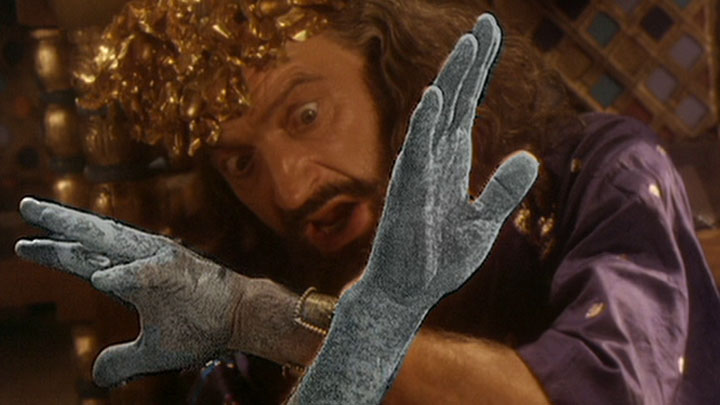
Indeed, Perseus shows Polydectes the head of Medusa and the king is promptly turned into stone. The dog comments that Perseus never did kill his grandfather. But then the storyteller explains that Perseus discovered the truth about Acrisius and travelled to meet him. The story is now told in the form of a series of animated black-figure scenes. Acrisius fled to Larissa and there met his fate: an accidental death at the hands of his unwitting grandson.
All in all, and despite the omission of the Andromeda-part of the original story, this is a great episode that serves as a good introduction to the story of Perseus, especially for younger viewers. It’s a pity that the Jim Henson Company never got a chance to do something like this again. It would have been interesting, for example, to see what they would have done with the stories surrounding Heracles.

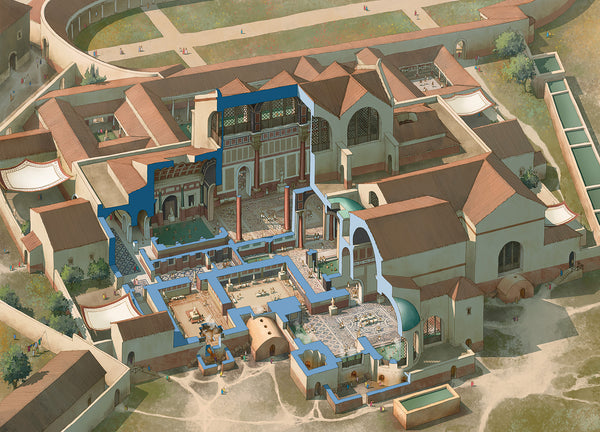
1 comment
Stunning professional acting. Like watching Shakespeare with Gambon and others. Loved it. As usual never fully appreciated by the bane public